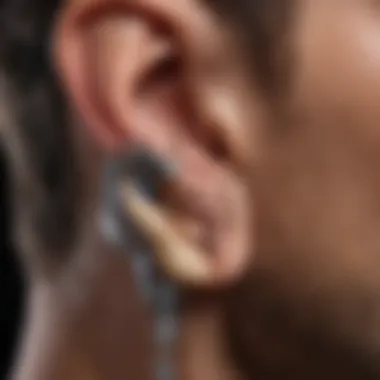Expert Insights on Dealing with a Clogged Ear from Water


Water Activity Overview
Water activities are popular among outdoor enthusiasts seeking thrilling experiences and a close connection with nature. From surfing to sailing, snorkeling, and paddleboarding, each activity offers its unique charm and challenges. Enthusiasts immerse themselves in the beauty of water bodies, exploring the depths and riding the waves to exhilaration.
When it comes to Surfing, individuals harness the power of ocean waves, skillfully maneuvering on surfboards to catch the perfect ride. The rush of adrenaline and the harmony with the sea create an unmatched experience for those seeking adventure.
Sailing, on the other hand, embraces the serenity of open waters, utilizing wind power to glide smoothly across expansive lakes or boundless oceans. Sailboats offer a sense of freedom and tranquility, embodying the elegance of human ingenuity cooperating with nature's elements.
Snorkeling invites explorers to delve into the underwater realm, observing colorful marine life and vibrant coral reefs beneath the surface. With the aid of snorkeling equipment, enthusiasts can witness the beauty of the ocean's hidden treasures up close, fostering appreciation for marine ecosystems.
Paddleboarding combines balance and finesse, enabling individuals to navigate serene waters while standing on paddleboards. This meditative activity not only enhances physical fitness but also provides mental clarity as paddlers glide through reflective waters, soaking in the tranquility of their surroundings.
Tips and Techniques
For beginners venturing into water activities, it's crucial to start with fundamental tips to ensure a safe and enjoyable experience. Understanding basic techniques such as proper paddling strokes, stance on a surfboard, or equalizing ear pressure while snorkeling lays a solid foundation for skill development and prevents common pitfalls.
Advanced enthusiasts can delve into intricate techniques that push the boundaries of their abilities, such as mastering complex surfing maneuvers, navigating challenging sailing conditions, or refining breathing techniques for deep-sea exploration. These advanced skills not only hone one's proficiency but also open up new horizons of excitement and achievement.
Safety should always remain a top priority for water sports enthusiasts, regardless of their skill level. Adhering to safety guidelines such as wearing appropriate gear, checking weather conditions before embarking on water activities, and practicing emergency protocols ensures a secure and worry-free experience on the water.
Gear Reviews
Selecting the right gear is paramount to success and comfort in water activities. Surfboards come in various shapes and sizes, catering to different skill levels and wave conditions. Choosing the right surfboard can significantly impact one's surfing experience, from stability to maneuverability in the water.
Sailboats encompass a diverse range of designs and features, each suited for specific sailing conditions and preferences. Factors such as hull type, rigging setup, and sail materials play a crucial role in determining the performance and handling of a sailboat, influencing the overall sailing experience.
Snorkeling equipment, including masks, snorkels, and fins, should provide a snug fit and clear vision to enhance underwater exploration. Quality gear ensures comfort, durability, and safety while immersing oneself in the aquatic wonders beneath the surface.
Paddleboards vary in design, offering options for different skill levels and water environments. Wetsuits provide thermal insulation and protection against abrasions, allowing paddlers to extend their water adventures in various climates and seasons.
Destination Guides
Exploring popular water sports locations provides enthusiasts with a spectrum of environments to enjoy their favorite activities. From world-renowned surfing hotspots to secluded snorkeling paradises, each destination offers a unique blend of challenges and rewards for water enthusiasts.
Discovering hidden gems for water sports allows enthusiasts to escape the crowds and connect with nature on a more intimate level. Remote coves for paddleboarding, secret surf breaks, and uncharted snorkeling sites unveil unspoiled beauty waiting to be explored by those willing to venture off the beaten path.
Travel tips for water sports trips encompass essential considerations such as packing light and efficiently, researching local regulations and conditions, and respecting the environment. Navigating travel logistics with precision and mindfulness ensures smooth-sailing journeys for water enthusiasts seeking memorable experiences.
Understanding the Issue
Dealing with a clogged ear from water is a common yet discomforting problem that merits attention. It affects individuals engaging in water-related activities, impacting their hearing and overall well-being. Understanding the causes, symptoms, and complications of water-related ear clogs is vital for effective management and prevention strategies. This article delves deep into this issue, offering insights that are crucial for water sports enthusiasts to safeguard their ear health.
Causes of Water-Related Ear Clogs
Ingress of Water into the Ear Canal
The ingress of water into the ear canal is a primary cause of ear clogs. It occurs when water is trapped in the ear canal, leading to blockages and discomfort. This issue is exacerbated during water activities, necessitating preventive measures to mitigate its effects. Addressing the ingress of water is crucial in managing clogged ears, and this article provides comprehensive strategies to combat this common problem.
Excessive Moisture or Humidity


Excessive moisture or humidity in the ear canal can contribute to the clogging of ears. Prolonged exposure to damp environments can lead to the accumulation of moisture, creating an ideal breeding ground for bacteria and fungi. This can result in ear discomfort and reduced hearing capabilities. Understanding the role of excessive moisture in ear clogs is essential for implementing preventive measures and prompt interventions.
Irritation from Chemicals in Water
Irritation from chemicals in water can irritate the delicate structures of the ear, leading to inflammation and blockages. Exposure to chlorine, saltwater, or other contaminants present in swimming pools or natural water bodies can trigger adverse reactions in the ear canal. Recognizing the impact of chemical irritation on ear health is pivotal in adopting protective measures and choosing suitable ear care products.
Symptoms of a Clogged Ear
Reduced Hearing
A common symptom of a clogged ear is reduced hearing acuity. Blockages in the ear canal hinder the transmission of sound waves, leading to muted or distorted auditory perception. Individuals experiencing reduced hearing due to ear clogs may struggle to communicate effectively and experience difficulties in various environments. Addressing this symptom promptly is vital for restoring clear hearing and preventing further complications.
Feeling of Fullness in the Ear
The sensation of fullness in the ear is a prevalent indicator of ear clogs. Individuals may perceive a feeling of pressure or congestion in the ear, akin to having water trapped inside. This discomfort can be unsettling and affect daily activities, underscoring the importance of timely intervention and ear care practices. Understanding the significance of this symptom is crucial in managing clogged ears effectively.
Discomfort or Pain
Ear discomfort or pain is a distressing manifestation of clogged ears. The presence of blockages in the ear canal can trigger varying degrees of discomfort, ranging from mild irritation to sharp pain. This symptom can significantly impact an individual's quality of life, necessitating proactive measures to alleviate pain and address the underlying causes. Recognizing the implications of discomfort or pain in ear clogs is essential for comprehensive ear care.
Complications of Untreated Ear Clogs
Increased Risk of Infections
Untreated ear clogs pose an increased risk of infections in the ear canal. Accumulated moisture and debris create a conducive environment for bacterial or fungal growth, leading to infections such as otitis externa. Neglecting to address ear clogs promptly can result in recurrent infections and further complications, emphasizing the importance of proactive ear care and timely interventions.
Prolonged Discomfort
Prolonged discomfort associated with untreated ear clogs can impact an individual's physical and emotional well-being. Persistent ear blockages can cause ongoing discomfort, affecting daily activities and quality of life. Addressing the root causes of ear clogs and seeking appropriate treatment are essential in alleviating prolonged discomfort and preventing escalation of symptoms.
Potential Damage to the Ear Structures
The presence of untreated ear clogs carries the risk of potential damage to the delicate structures of the ear. Continued pressure and blockages in the ear canal can lead to structural changes, impeding normal hearing functions. Understanding the long-term implications of untreated ear clogs is vital for preserving ear health and preventing irreversible damage. This article elucidates the risks associated with untreated ear clogs and highlights the importance of proactive ear care practices.
Preventive Measures
In this article, understanding and implementing preventive measures are paramount to ensure optimal ear health, especially for individuals engaging in water activities regularly. By adopting preventive measures, one can significantly reduce the risk of experiencing bothersome ear clogs caused by water. These measures not only alleviate discomfort but also promote general well-being by safeguarding against potential complications that may arise from untreated ear clogs.
Tips to Avoid Ear Clogs from Water
Use Earplugs When Swimming
When it comes to preventing ear clogs from water, using earplugs while swimming plays a pivotal role. Earplugs act as a protective barrier, minimizing the ingress of water into the ear canal. This simple yet effective practice helps maintain ear hygiene and prevents moisture-related issues, such as infection or irritation. The key characteristic of utilizing earplugs is their ability to create a waterproof seal, ensuring water does not enter the delicate ear structures. It is a beneficial choice for this article due to its practicality and proven effectiveness in reducing the likelihood of ear clogs.
Avoid Submerging Head Completely
Another crucial tip to prevent ear clogs from water is to avoid submerging the head completely while swimming or bathing. By keeping the head above water level, you can minimize the chances of water entering the ears forcefully, which is a common cause of ear blockages. This practice is crucial, especially for individuals prone to ear sensitivity or frequent clogs. The unique feature of this approach lies in its simplicity and accessibility, making it a convenient preventive measure for maintaining ear health.
Ensure Proper Drying of Ears After Water Exposure
Ensuring thorough drying of the ears post water exposure is essential to prevent moisture buildup, a leading factor in ear clogs. By gently tilting the head and allowing excess water to drain out, followed by using a soft towel or a hair dryer on a low setting, you can promote effective drying. This practice helps maintain the ear's natural balance and reduces the risk of developing clogs. The advantage of proper ear drying lies in its simplicity yet significant impact on preventing discomfort and complications associated with water-related ear issues.


Effective Strategies for Prevention
In addition to basic preventive measures, implementing effective strategies for prevention is crucial for individuals at higher risk of recurrent ear clogs. By considering tailored approaches, such as installation of ear tubes for chronic ear issues or seeking personalized advice from an ENT specialist, one can proactively address underlying concerns contributing to ear clogs. These strategies offer targeted solutions based on individual needs, ensuring a proactive approach towards managing and preventing ear clogs effectively.
Install Ear Tubes for Chronic Ear Issues
For individuals with chronic ear problems predisposing them to recurrent clogs, installing ear tubes can provide long-term relief. Ear tubes help equalize pressure, drain fluids, and prevent the accumulation of debris that may lead to clogs. The key characteristic of ear tubes is their ability to promote ventilation and prevent blockages, making them a popular choice for managing chronic ear issues. The unique feature of ear tubes lies in their customizable nature, offering tailored solutions to specific ear conditions and providing effective prevention against recurring clogs.
Consult with an ENT Specialist for Individualized Advice
Seeking advice from an Ear, Nose, and Throat (ENT) specialist offers personalized insights into managing ear clogs effectively. ENT specialists can conduct comprehensive evaluations to identify underlying factors contributing to ear clogs and recommend suitable interventions. The key characteristic of consulting with an ENT specialist is the specialized care and expertise they bring, guiding individuals towards personalized treatment plans for optimal ear health. The unique feature of this approach is the individualized advice and evidence-based recommendations provided by specialists, ensuring targeted prevention and management strategies tailored to the individual's unique ear health needs.
Home Remedies and Treatment Options
In this comprehensive guide on Dealing with a Clogged Ear from Water, the section on Home Remedies and Treatment Options plays a vital role in providing practical solutions for individuals experiencing ear clogs. When addressing such discomfort, relying on safe and natural remedies can often offer relief and help in managing the symptoms effectively. From alleviating the feeling of fullness in the ear to restoring normal hearing, these remedies form an essential aspect of self-care and treatment for minor ear clogs.
Safe and Natural Remedies for Ear Clogs
Steam Inhalation
Exploring the significance of steam inhalation as a remedy for ear clogs, this method involves inhaling steam to help loosen ear wax and unclog the ear canal. Steam inhalation can aid in relieving pressure and discomfort in the ear by promoting natural drainage. Its gentle and non-invasive nature makes it a popular choice for individuals looking for a natural approach to ear care. The warmth of the steam can soothe the ear canal and provide temporary relief from symptoms, though it may not be suitable for severe or persistent clogs.
Hydrogen Peroxide Drops
Delving into the use of hydrogen peroxide drops for treating ear clogs, these drops work by softening ear wax and facilitating its removal from the ear canal. The effervescent action of hydrogen peroxide helps to break down the wax buildup, making it easier to clear the blockage. This method is considered safe and effective for mild ear clogs, offering a gentle way to address the issue at home. However, it is essential to follow proper instructions and consult a healthcare professional if experiencing any discomfort or unusual symptoms.
Warm Compress
Discussing the application of a warm compress as a remedy for ear clogs, this technique involves placing a warm, not hot, compress against the affected ear to help reduce pain and promote circulation. The warmth from the compress can aid in loosening ear wax and alleviating pressure, providing comfort to individuals dealing with ear clogs. This simple and cost-effective remedy can be easily done at home to provide immediate relief from minor ear blockages, although it may not be suitable for all types of ear issues.
Medical Interventions for Stubborn Ear Clogs
In cases where home remedies may not suffice, seeking medical interventions becomes necessary to address stubborn ear clogs effectively. Professional treatments administered by healthcare providers can offer targeted solutions for more severe or persistent ear issues, ensuring proper care and management.
Ear Irrigation by Healthcare Professional
Exploring the procedure of ear irrigation by a healthcare professional for stubborn ear clogs, this method involves using a gentle stream of water to flush out ear wax and debris from the ear canal. Ear irrigation can effectively remove blockages that have not responded to home remedies, providing relief and restoring normal hearing. The controlled nature of this procedure ensures safety and accuracy in cleaning the ear canal, though it is essential to seek such interventions from trained professionals.
Prescribed Ear Drops for Blockage Removal
Delving into the use of prescribed ear drops for removing blockages, these specialized drops are formulated to break down ear wax or debris, allowing for easier clearance from the ear canal. Prescribed ear drops provide a targeted approach to managing stubborn ear clogs, offering effective results under the guidance of a healthcare provider. While these drops can be beneficial in resolving blockages, it is crucial to follow the instructions meticulously and seek professional advice to avoid any potential complications.
Seeking Professional Help
In the journey of dealing with a clogged ear from water, seeking professional help stands as a pivotal step towards resolving the discomfort and potential complications. Professional intervention ensures a thorough evaluation of the ear condition, identifying underlying issues and crafting tailored solutions. By consulting a healthcare provider, individuals can receive expert guidance on managing persistent symptoms that resist home remedies effectively.
When to Consult a Healthcare Provider
Persisting Symptoms Despite Home Remedies


Persisting symptoms despite diligent home remedies signify a crucial point to engage with a healthcare provider. These lingering issues may indicate a deeper-seated problem requiring specialized attention. Seeking help in this context ensures a comprehensive approach towards alleviating discomfort and restoring ear function. The uniqueness of persisting symptoms lies in their ability to persist despite initial attempts at self-treatment, prompting the need for professional assessment and intervention.
Severe Pain or Discomfort
Severe pain or discomfort signals a red flag for immediate medical consultation. Such intense sensations merit prompt evaluation to prevent escalation or complications. Addressing severe pain timely ensures appropriate management and relief, safeguarding ear health and overall well-being. The distinctive feature of severe pain lies in its incapacitating nature, necessitating swift medical attention for effective resolution.
Hearing Loss Accompanied by Ear Clog
The co-occurrence of hearing loss with an ear clog warrants urgent medical attention to prevent potential ramifications. Hearing impairment coupled with ear blockage underscores the need for specialized assessment by healthcare professionals. This manifestation suggests underlying issues that demand targeted interventions for optimal outcomes. The unique aspect of hearing loss combined with an ear clog emphasizes the necessity of swift action to mitigate risks and preserve auditory function.
The Role of an ENT Specialist
Engaging with an Ear, Nose, and Throat (ENT) specialist plays a pivotal role in managing ear-related concerns effectively. ENT specialists offer specialized expertise in diagnosing and treating various ear conditions, ensuring comprehensive and personalized care. By collaborating with ENT professionals, individuals benefit from precise diagnostic evaluations, leading to tailored treatment plans for enhanced outcomes.
Diagnostic Evaluation of Ear Condition
The diagnostic evaluation of ear conditions by ENT specialists involves a meticulous assessment to identify root causes and determine the most suitable interventions. This thorough examination aids in understanding the specific issues affecting the ear, guiding the formulation of appropriate treatment strategies. The distinctiveness of diagnostic evaluations lies in their precision and detail-oriented approach, enabling accurate diagnosis and targeted treatments.
Customized Treatment Plans
ENT specialists develop customized treatment plans tailored to individual needs, taking into account unique factors influencing ear health. These personalized interventions aim to address specific concerns effectively, optimizing outcomes and promoting long-term ear wellness. The key characteristic of customized treatment plans is their focus on personalized care, ensuring that interventions align with the individual's requirements and health goals.
Follow-up Care for Recurrent Issues
Follow-up care for recurrent ear issues plays a vital role in sustaining ear health and preventing future complications. Regular monitoring and post-treatment follow-ups facilitate the early detection of any recurring problems, enabling timely interventions. The significance of follow-up care lies in its proactive approach towards managing recurrent issues, ensuring continuous support and preventive measures for long-term ear well-being.
Long-Term Ear Care Practices
Long-term ear care practices hold a critical role in maintaining optimal ear health post-clog resolution. Consistent adherence to ear care routines can help prevent the recurrence of ear-related issues and promote overall well-being. By committing to long-term strategies, individuals can safeguard their ears from future clogs and potential complications. Furthermore, prioritizing ear care practices ensures sustained auditory health, vital for various daily activities.
Maintaining Ear Health after Clog Resolution
Regular Ear Check-ups
Regular ear check-ups form an essential aspect of post-clog resolution care. These routine examinations by healthcare providers assess the condition of the ears, identifying any potential issues early on. This proactive approach aids in monitoring ear health status, allowing for timely intervention if any abnormalities are detected. Regular ear check-ups contribute significantly to the overall goal of sustained ear wellness.
Proper Ear Cleaning Techniques
Applying proper ear cleaning techniques is instrumental in maintaining ear hygiene post-clog resolution. Correct cleaning methods help prevent the buildup of earwax and debris, reducing the risk of ear canal blockages. By adopting appropriate cleaning practices, individuals can mitigate the chances of future ear clogs and associated discomfort. However, it is crucial to exercise caution and avoid aggressive cleaning, which can harm the delicate ear structures.
Precautions During Water Activities
Taking precautions during water activities is paramount to prevent future ear clogs. Implementing measures such as wearing earplugs and ensuring ear canal protection can significantly reduce the risk of water-related issues. By safeguarding the ears during aquatic endeavors, individuals can minimize the entry of water and potential irritants, thus promoting long-term ear health. Incorporating preventive strategies into water-related engagements is essential for maintaining clear and healthy ears.
Lifestyle Changes to Prevent Future Ear Clogs
Limiting Water Exposure to Ears
Limiting water exposure to the ears is beneficial in preventing future ear clogs. Avoiding prolonged periods of water immersion and implementing protective measures can help reduce the likelihood of water-induced ear issues. By mindful management of water exposure, individuals can lower the risk of moisture-related ear concerns, safeguarding their auditory well-being.
Using Ear Protection in Noisy Environments
Utilizing ear protection in noisy environments is crucial for overall ear wellness. Exposure to loud noise can damage hearing over time, leading to potential ear complications. By wearing ear protection such as earmuffs or earplugs in noisy settings, individuals can preserve their hearing capabilities and minimize the risk of auditory damage. Prioritizing ear protection enhances long-term ear health and supports sustained hearing acuity.
Healthy Habits for Overall Ear Wellness
Incorporating healthy habits into daily routines is vital for promoting overall ear wellness. Practices like maintaining a balanced diet, staying hydrated, and avoiding excessive ear manipulation contribute to ear health. Additionally, practicing good ear hygiene, such as using gentle cleaning methods, fosters a healthy ear environment. By cultivating these habits, individuals can proactively care for their ears and reduce the likelihood of future ear-related issues, ensuring long-term auditory well-being.















